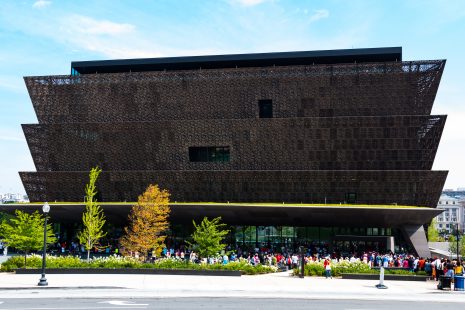Black History Month as Told by Molex Black Professionals

African American Museum-a Smithsonian Institute
We all know the movie-goers who, after the final scene, continue to sit planted in their chairs, intently watching the rolling credits. These people have the “staying power” to focus on each person’s name and the role they played in helping to create a must-see movie. Those 3 to 5 minutes of acknowledging each person’s contribution may be the only time a cast member or crew person gets noticed. Black History Month is like those few moments—a short amount of time we take to recognize and honor those of African descent who helped in the unleashing of prosperity in free societies.
As the credits roll, we see the likes of:
Dr. Rebecca Lee Crumpler, M.D.
The first African American woman who became a doctor
George Biddle Kelley
The first African American engineer registered in the state of New York
Richard Allen
The founder of the African Methodist Episcopal (AME) Church in America
Patricia Bath
The first African American to complete a residency in ophthalmology and the first African American female doctor to receive a medical patent
This Black history narrative is a story that must be told. Dr. Henry Louis Gates Jr., an award-winning African American literary scholar, produces and hosts the renowned PBS series that speak of the historical and current Black experience. He understands that remembering who we are is key to any significant progress of a global community. Knowledge of self is empowering—it grounds us to truth, inspires us to achieve greatness and allows us to self-actualize as individuals and as a collective. To that point, Black History Month is not sufficient in and of itself, but it is a start to honoring the impact and legacy of Black people who have attained merit and distinction in their respective endeavors. The African American museum, a Smithsonian Institute, is a phenomenal resource to learn about this great legacy and is the ultimate “theatre” for people to see the outstanding roles Blacks have played in our history.
The observance of Black History Month is an opportunity for people of all backgrounds, ethnicities and life experiences to take a meaningful step toward mutual understanding and respect (a key MBM Guiding Principle). This special celebration is free to all who decide to be intentional by investing their time to understand the contributions and history of those who are descendants of African kings and queens. Unfortunately, the contributions of people of African descent have for centuries been systematically left out of the history books, our recognition deferred—but this time of remembrance speaks to the relevance of the truth about Black history and how it is a critical part of our comprehensive U.S. and world history.
Black History Month is also a time to raise awareness of the fight for freedom and equal opportunity as well as an awareness of innovation, bravery and achievement. This month is about deliberately making the time not only to learn about the struggles and the achievements of Blacks, but also to plan and deliver measures of fairness and justice. During this time, we seek out opportunities to pursue social, economic, scientific and spiritual excellence, while simultaneously doing the necessary work for peace and equity.
So, in February, we sit—we stay—and we watch the closing credits of a masterful Black history storyline. During Black History Month we take in all the names of the great men and women who, with strength and resilience, gave the performance of a lifetime, not to entertain us, but to challenge each of us to move forward with the same grace and power for equity, excellence and love. One day, someone will remain after the “show” and consider our names and the roles we played on the big screen of our lifetimes. So, let’s make it a performance worthy of a standing ovation with lasting applause!